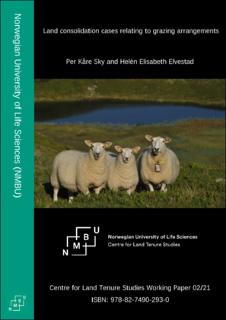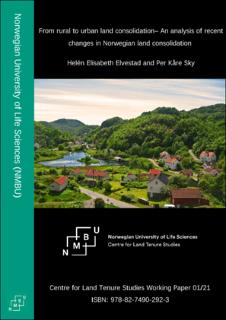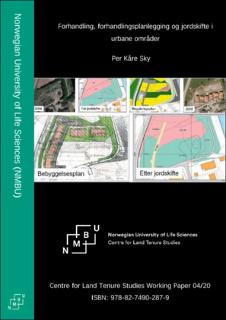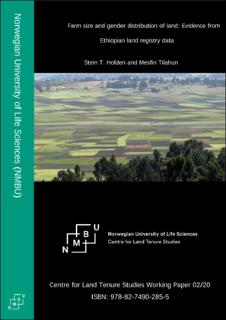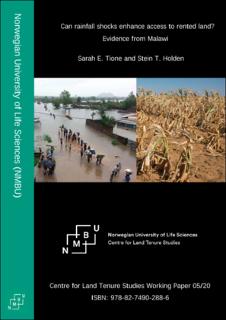Location
The Centre for Land Tenure Studies was opened at the Nowegian University of Life Sciences (NMBU) on the 27th of June 2011 resulting from a joint initiative by researchers at the Department of International Environment and Development (Noragric), the School of Economics and Business, and the Department of Landscape Architecture and Spatial Planning. In 2012 was joined by the Department of Ecology and Natural Resource Management.
Mission
The Centre for Land Tenure Studies (CLTS) at NMBU is established to further the study of land tenure. Land tenure studies define a broad and complex field of study cutting across many disciplines. For CLTS this entails, but is not limited to, the following activities:
- Provide a common arena for discussing land tenure issues, including a series of seminars directed to present new research or important theoretical perspectives. This may be designed as part of an educational program.
- Promulgate a joint series of working papers.
- Support international publication of articles and books.
- Develop and conduct joint courses at both Master and PhD level.
- Initiate and support exchange of researchers.
- Participate in research networks related to land tenure.
- Maintain a public list of collaborating institutions and researchers.
- Initiate and develop applications for research funds to support basic research on land tenure both by our own efforts and in collaboration with other research groups working on land tenure questions.
In its activities the centre will use English as its working language as far as practically possible. In short we may say that the mission of the Centre for Land Tenure studies is to enhance collaboration across departments at NMBU; to strengthen the visibility of NMBU activities within the field of land tenure; to strengthen NMBU’s international collaboration and networks within the field; to contribute to research and knowledge generation on land tenure issues; to help build capacity in the South and in Norway within the field; to disseminate policy lessons, and to contribute to policy debates.
Resources
Displaying 1 - 5 of 67Land consolidation cases relating to grazing arrangements
Land consolidation courts deal with cases where the relationship between holders of grazing rights needs be regulated, but also where the rights holders are competing with other potential land uses, such as building holiday cabins, forestry, hunting, etc. These cases are governed by the provisions of sections 3-8 and 3-10 of the Land Consolidation Act.
From rural to urban land consolidation– An analysis of recent changes in Norwegian land consolidation
In most countries, land consolidation was first introduced in rural areas, with legislation suitable for urban areas being drafted at a later date. This is also true of Norway. The first evidence of urban competency in the legislation is found in the Land Consolidation Act from 1950. It is important to note that in Norway land consolidation remains the exclusive province of the court system. This, as far as we know, is unique for Norway.
Forhandling, forhandlingsplanlegging og jordskifte i urbane områder
Negotiations are important in urban densification processes. In particular, integrative negotiations seem to be relevant. The conflicts between neighbors and developers can be challenging to solve. Land readjustment is used in several countries to merge properties or reshape properties in conjunction with densification projects. Conflicts can be handled and reduced by land readjustment. Should such a measure be relevant in Norway, it is recommended, among other things, that a majority of the landowners within a land readjustment area must be in favor.
Farm size and gender distribution of land: Evidence from Ethiopian land registry data
Land is an essential asset for the livelihood and welfare of rural households in agriculture-based rural economies. This study utilizes land registry data from the First and Second Stage Land Registration (FSLR and SSLR) Reforms that took place in 1998 and 2016 in Tigray region of Ethiopia, the first region in Ethiopia to implement land registration and certification. Second Stage Land Registration and Certification (SSLR&C) provided households with parcel-based certificates with names of all holders.
Can rainfall shocks enhance access to rented land? Evidence from Malawi
This study investigates whether and to what extent rainfall shocks recurring in Sub-Saharan Africa, that have been associated with distress land rentals, enhance short-term and medium-term access to rented land by tenant households. Tenant households’ rental decisions are modeled in the state-contingent framework with renting-in of land as a risky input choice. Our data is from three rounds of LSMS data from Malawi used to construct a balanced household panel, combined with corresponding district rainfall data that are used to generate seasonal district-wise rainfall shock variables.








